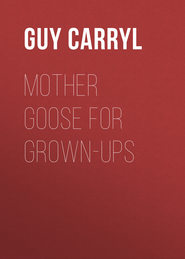По всем вопросам обращайтесь на: info@litportal.ru
(©) 2003-2024.
✖
The Transgression of Andrew Vane: A Novel
Автор
Год написания книги
2017
Настройки чтения
Размер шрифта
Высота строк
Поля
"Go on!" observed Mrs. Carnby.
"There is really nothing more of importance," said her husband, "except that I've also received a note from young Vane. He's at the Ritz."
"Of course!" ejaculated Mrs. Carnby. "Paying two louis per diem for his room, and making semi-daily trips to Morgan, Harjes'. They're wonderful, these tourist bank-accounts. Their progress from a respectable amount to absolute zero is as inevitable as the recession of the sea from high-water mark to dead low tide – a steady withdrawal from the bank, my dear Jeremy! How old might the young gentlemen be?"
Mr. Carnby made a mental calculation.
"His mother was about my own age," he said presently. "I know she and I used to go to dancing-school together. And she died in childbirth, if I remember rightly. Her husband was a scamp – ran off with another woman. I never saw him. That would make the boy about twenty or twenty-one."
"He will be rather good-looking," said Mrs. Carnby reflectively, "with a general suggestion of soap and cold water about him. He will wear preposterously heavy boots with the soles projecting all around like little piazzas, and a straw hat, and dog-skin gloves with seams like small hedges, and turned back at the wrists. They're all exactly alike, the young Americans one sees over here. One would think they came by the dozen, in a box. And when he is sitting down he will be hitching at his trousers all the time, so that the only thing one remembers about him afterwards is the pattern of his stockings."
"We ought to invite him to dinner," suggested Jeremy.
"Without doubt," agreed his wife; "but to breakfast first, I think – and on Sunday. One can judge a man's character so well by the way he behaves at Sunday breakfast. If he fidgets, and drinks quantities of water, then he's dissipated! I don't know why Saturday night is always fatal to dissipated men, but it is. If his top hat looks as if it had been brushed the wrong way, then he's religious, and has been to church. I shall go out and inspect it while you're smoking. If he does all the talking, he's an ass; and if I do it all, he's a fool."
"You're a difficult critic, my dear," said Jeremy. "You must remember he is only twenty or so."
"To be twenty or so in appearance is a man's misfortune," replied Mrs. Carnby. "To be twenty or so in behaviour is his fault. I'll write to him to-night, and ask him to breakfast on Sunday, tout à fait en famille, and we'll try him on a – you don't mind my calling you a dog, Jeremy?"
"Not in the least," said Mr. Carnby.
"Eh bien!" said his wife. "We'll have him to breakfast on Sunday, and try him on a dog! If he's presentable and amusing, I shall make him my exclusive property. If he's dull, I shall tell him Madame Palffy is a woman he should cultivate assiduously. I send her all the people who don't pass muster at my dinners. She has them next day, like warmed-over vol-au-vents. My funeral baked meats do coldly furnish forth her breakfast-table."
"When you wish to appear most unmerciful, my dear," said Jeremy, "you always pick out Madame Palffy; and whenever you do, I spoil the effect of what you say by thinking of – "
"Margery?" put in Mrs. Carnby. "Yes, of course, that's my soft spot, Jeremy. There's only one thing which Margery Palffy ought to be that she isn't, and that's – ahem! – an orphan."
CHAPTER II
NEW FRIENDS AND OLD
In ordinary, Mrs. Carnby was one of the rare mortals who succeed in disposing as well as in proposing, but there were times when there was not even a family resemblance between her plans and her performances. She had fully intended that young Vane should be the only guest at her Sunday breakfast, but as she came out of church that morning into the brilliant sunlight of the Avenue de l'Alma, she found herself face to face with the Ratchetts, newly returned from Monte Carlo, and promptly bundled the pair of them into her victoria. Furthermore, as the carriage swung round the Arc, and into the Avenue du Bois, she suddenly espied Mr. Thomas Radwalader, lounging, with an air of infinite boredom, down the plage.
"There's that Radwalader, thinking about himself again!" she exclaimed, digging her coachman in the small of his ample back with the point of her tulle parasol. "Positively, it would be cruelty to animals not to rescue him. Arretez, Benoit!"
Radwalader came up languidly as the carriage stopped.
"Where are you going?" demanded Mrs. Carnby, after greetings had been exchanged.
"Home," answered Radwalader. "I met Madame Palffy back there a bit, and couldn't get away for ten minutes. You know, it's shocking on the nerves, that kind of thing, so I thought I'd drop in at my quarters for a pick-me-up."
"Well, if I'm not a pick-you-up, I'm sure I don't know what is," said Mrs. Carnby. "You're to come to breakfast. You'll have to walk, though. We're three already, you see, and I don't want people to take my carriage for a panier à salade. I hadn't the most remote intention of asking you; but when a man tells me he's been talking for ten minutes to that Palffy, I always take him in and give him a good square meal."
"You're very kind," said Radwalader. "Are you going to play bridge afterwards? If so, I must go home for more money."
"Nothing of the sort!" said Mrs. Carnby emphatically. "There's a protégé of Jeremy's coming to breakfast – a Bostonian, twenty years young, and over here for his health. You must all go, directly after coffee. I'm going to spend the afternoon feeding him with sweet spirits of nitre out of a spoon, and teaching him his catechism. Perhaps you'd like to stay and learn yours?"
"I think I know it," laughed Radwalader.
"If you do, it's one of your own fabrication, then – with just a single question and answer. 'What is my duty toward myself? My duty toward myself is, under all circumstances, to do exactly as I dee please.'"
"If that were the case, my good woman, I should live up to my profession of faith, not only by accepting your invitation, as I mean to do, but by staying the entire afternoon."
"That's very nicely said indeed," answered Mrs. Carnby. "Allez, Benoit!"
Twenty minutes later the whole party were assembled in her salon. Carnby, caught by his wife as he was scuttling into his study, was now doing his visibly inadequate best to entertain Philip Ratchett, who stood gloomily before him, with his legs far apart, his hands in his pockets, and his eyes on the top button of his host's waistcoat. He was a typical Englishman, of the variety which leans against door-jambs in the pages of Punch, and makes unfortunate remarks beginning with "I say – " about the relatives of the stranger addressed. Society bored him to the verge of extinction, but it is only fair to say that he repaid the debt with interest. He was tolerated – as many a man before and after him has been – for the sake of his wife.
Mrs. Ratchett patronized, with equal ardour, a sewing-class which fabricated unmentionable garments of red flannel for supposedly grateful heathen, and a society for psychical research which boasted of liberal-mindedness because it was willing to admit that, at the dawn of the twentieth century, the causes of certain natural phenomena yet remained unexplained. Her entire conception of life underwent a radical change whenever she read a new book, which she did at fortnightly intervals. She was thirty, clever, and frankly beautiful, hence a factor in the Colony.
The fifth member of the company in Mrs. Carnby's salon, Mr. Thomas Radwalader, enjoyed the truly Parisian distinction of being an impecunious bachelor who did not accept all the invitations he received. He might have been thirty-five or forty-five or fifty-five. His smooth-shaven, impassive face offered no indication whatever of his age. He was already quite gray, but, in contrast to this, his speech was tinged with a frivolity, rather pleasant than otherwise, which hinted at youth. Mrs. Carnby had once described him as being "dappled with knowledge," and this, in common with the majority of Mrs. Carnby's estimates, came admirably near to being exact. Radwalader's actual fund of information was far less ample than was indicated by the facility with which he talked on any and every subject, but he was master of the science of selection. He judged others – and rightly – by himself, and went upon the often-proven theory that a polished brilliant attracts more attention than an uncut Koh-i-nur. He made the superficial things of life his own, and on the rare occasions when the trend of conversation led him out of his depth, he caught at the life-belt of epigram, and had found his feet again before men better informed had finished floundering. He lived in a tiny apartment, on the safe side of nothing a year, and kept up appearances with a skill that was little short of genius. Gossip passed him by, a circumstance for which he was devoutly grateful, though it was due less to chance than to management.
Such was the company into which Mr. Andrew Sterling had despatched his grandson – in hopes that the change might be of benefit. As he came through the portières, young Vane proved to tally, in the main essentials of appearance, with Mrs. Carnby's prophetic estimate. He was somewhat more than rather good-looking, and essentially American, with the soap-and-cold-water suggestion strongly to the fore. Mrs. Carnby always noted three things about a man before she spoke to him – his hands, his linen, and his eyes. In the first two Andrew Vane qualified immediately; in the third his hostess was forced to confess herself at a loss. In singular contrast to a complexion dark almost to swarthiness, his eyes were large and of an intense steel-blue. He met those of another squarely, not alone with the frankness characteristic of youth, but with the strange calm of confidence typical of men accustomed to the command of a battle-ship or an army corps. Mrs. Carnby, in ordinary the most self-possessed of women, gave, almost guiltily, before the keen, clear eyes of Andrew Vane.
"He has no business whatever to have eyes like that, at his age," she told herself, almost angrily. "They ought to grow in a man's head, after he has seen everything there is to be seen."
The thought was involuntary, but it recalled to her memory where she had seen their like before.
"Radwalader has them," she added mentally. "Good Lord! Radwalader! And this child hasn't even graduated!"
During the brief interval between the general introduction and the announcement of breakfast, she studied her new guest with unwonted interest. He was of the satisfactory medium height at which a man is neither contemptible nor clumsy, slight in build, but straight as an arrow, with narrow hips and a square backward fling of shoulder which spoke of resolution.
"He has 'No Compromise' written all over his back," said Mrs. Carnby to herself. "I should believe everything he told me, and not be afraid of what I told him."
Then she noted that he was eminently at ease. There is something out of the common about twenty that keeps its hands hanging at its sides, and its feet firmly planted, without suggesting a tailor's dummy. Andrew was talking to Mr. Carnby about his grandfather and Boston, and from the first to the last word of the short colloquy he did not once shift his position. As he stood thus, in some curious fashion consideration of his years was completely eliminated from one's thought of him. He was deferential, but in the negative manner of guest to host, rather than in the positive of youth to age; and, at the same time, he was assertive, but with the force of personality, not the conspicuity of awkwardness. He fitted into his surroundings instantly, like a wisely placed bibelot, but he dominated them as well.
"That Palffy," was Mrs. Carnby's final resolve, "shall get him only over my dead body."
And so, unconsciously, Andrew scored his first Parisian triumph.
For the first ten minutes of breakfast, Mrs. Carnby, at whose left he sat, let him designedly alone. It was her belief that men, like saddle-horses, should be given their heads in strange territory, and left to find themselves – this in contrast to the policy of her social rival, Madame Palffy, who boasted of being able to draw out the best there was in a new acquaintance in the first quarter-hour of conversation. In this she was probably correct, though in a sense which she did not perceive – for few good qualities survived the strain of that initial quarter-hour.
But if Mrs. Carnby's attention appeared to be engrossed by Radwalader on her right, and Mrs. Ratchett beyond Radwalader, she kept, nevertheless, a weather eye on Andrew; and when, presently, his spoon tinkled on his bouillon saucer, she turned to him.
"I've been watching you," she began, "to see how you would take to French oysters. It's a test I always apply to newcomers from America. If they eat only one Marennes verte, I know at once that they approve of forty-story buildings, and are going to talk about 'getting back to God's country'; if they eat all six, I know I may venture to hint that there are advantages about living in Paris, without having my head bitten off for being an expatriate."
"It would seem your head is quite safe, so far as I am concerned," laughed Andrew, "for I finished off my half-dozen, and thought them very good."
"Then you have the soul of a Parisian in the body of a Bostonian," affirmed Mrs. Carnby. "A liking for Marennes vertes is a survival of a previous state of existence. Here's Mr. Radwalader, for instance, who can't abide them, even after Heaven knows how many years in Paris."
"They taste so much like two-sou pieces that, whenever I eat them, they make me feel like a frog savings-bank," said Radwalader.
"There you are!" cried Mrs. Carnby triumphantly. "That would never have arisen as an objection in the mind of any one who had known what it is to be a Parisian."
"Or a frog savings-bank," said Radwalader. "No, I suppose not. I can't seem to live down the fact that I was born in the shadow of Independence Hall. But I'm doing so much to make up for the bad beginnings of my present incarnation, that I shall undoubtedly be a Parisian in my next. Have you been here long, Mr. Vane?"
"Three days."
"Do you speak French?" put in Mrs. Carnby. "No? What a pity! You've no idea what a difference it makes."









